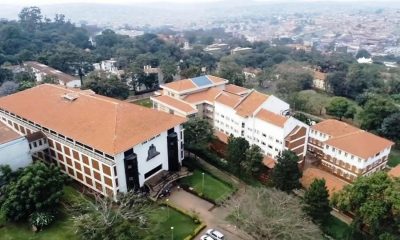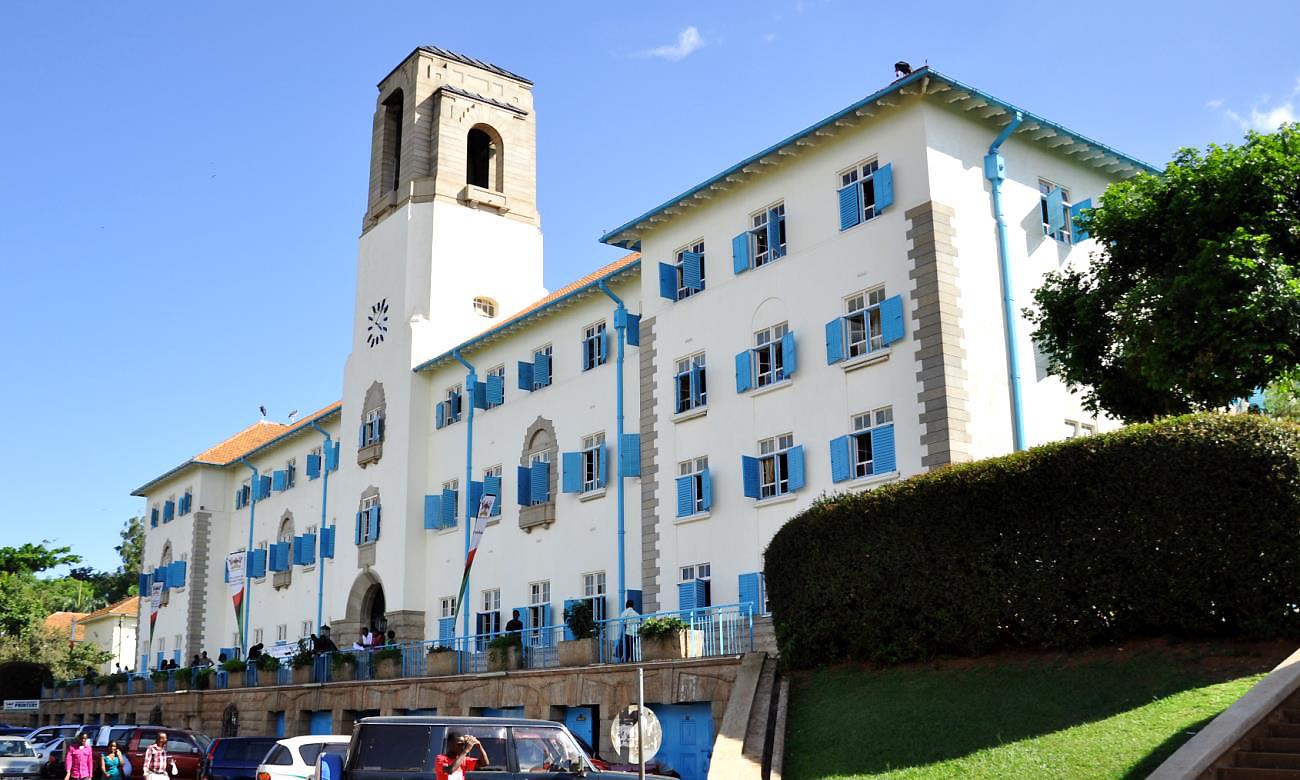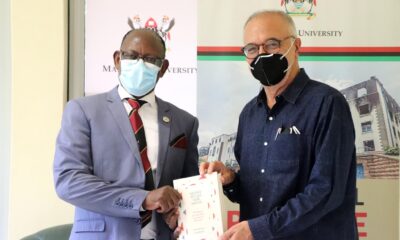Humanities & Social Sciences
Prof. Mamdani Shortlisted for 9th British Academy Book Prize 2021
Published
4 years agoon
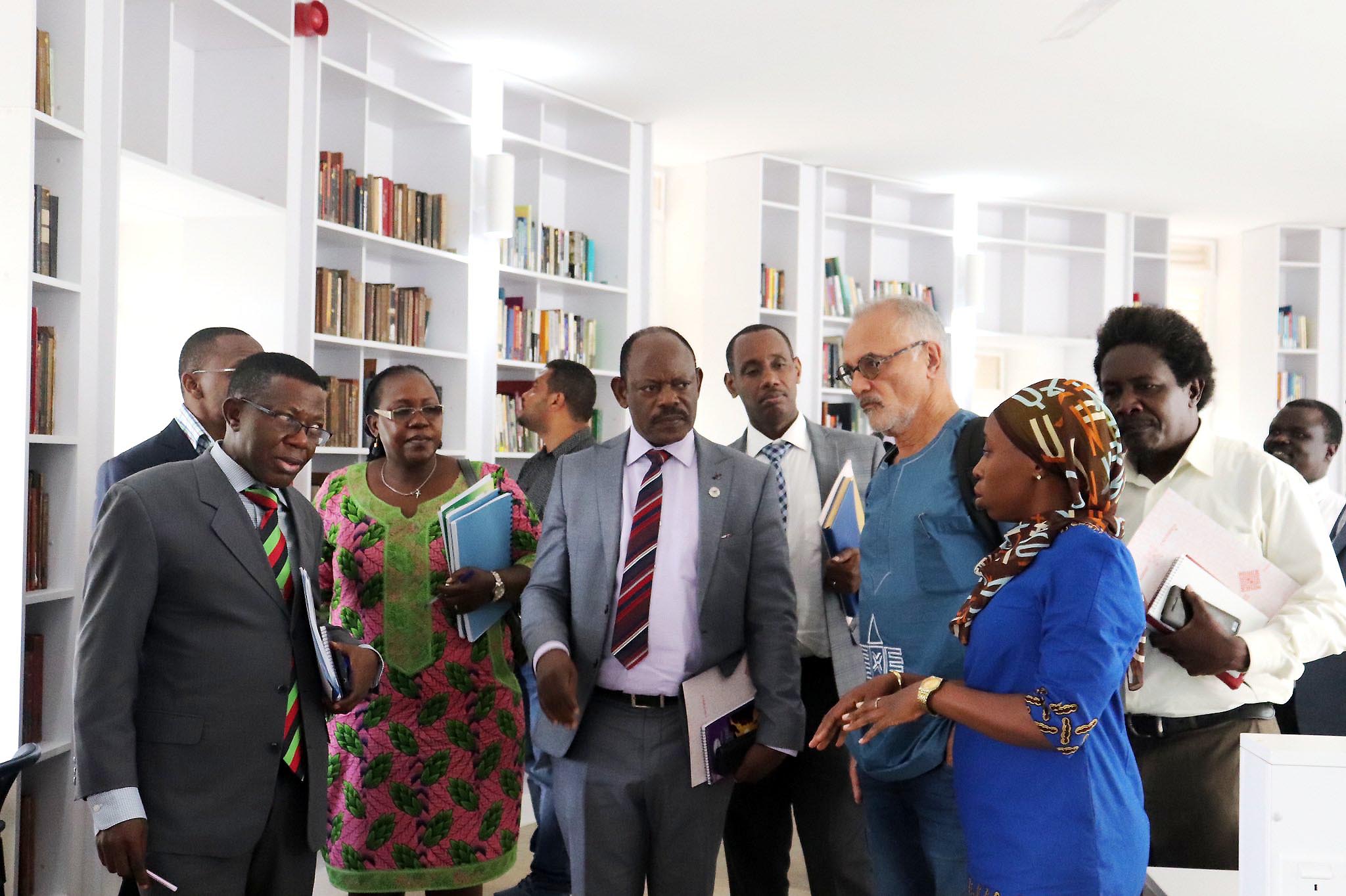
Professor Mahmood Mamdani, Director of the Makerere Institute of Social Research (MISR)’s book Neither Settler nor Native: The Making and Unmaking of Permanent Minorities has been shortlisted as one of four for the British Academy Book Prize for Global Cultural Understanding (2021).
According to the announcement released on Tuesday 7th September, 2001 on the British Academy website, the international book prize, worth £25,000, rewards and celebrates the best works of non-fiction that have contributed to public understanding of world cultures.
The other books shortlisted among Prof. Mamdani’s include; Islands of Abandonment: Life in the Post-Human Landscape by Cal Flyn, Begin Again: James Baldwin’s America and its Urgent Lessons for Today by Eddie S. Glaude Jr. and Waves across the South: A New History of Revolution and Empire by Sujit Sivasundaram.
The four 2021 shortlisted writers will be brought together from around the world for a special live online event, in partnership with the London Review Bookshop, on Wednesday 13 October and the winner will be announced on Tuesday 26 October.
Click here for the full announcement.
Humanities & Social Sciences
College of Humanities and Social Sciences Launches Five Groundbreaking Publications
Published
1 month agoon
December 12, 2025By
Eve Nakyanzi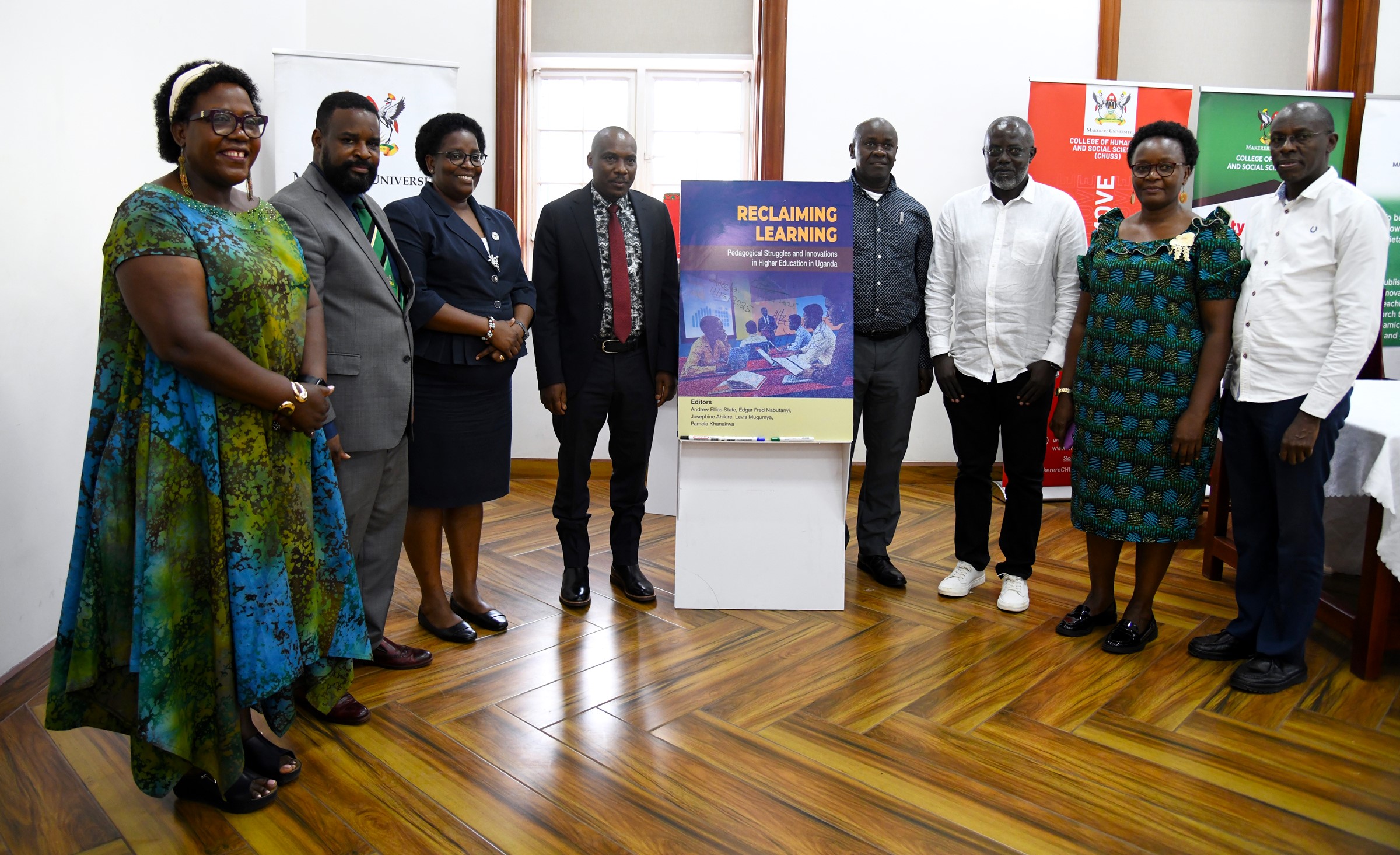
The College of Humanities and Social Sciences (CHUSS) on 11th December 2025 celebrated the launch of five scholarly books, marking a significant milestone in the College’s contribution to academic research and discourse. The event brought together faculty, students, and distinguished guests, highlighting the College’s commitment to advancing knowledge, preserving institutional memory, and fostering innovative scholarship.
Advancing Knowledge: Recognizing Authors and Promoting Research Excellence
Representing the Vice Chancellor and Deputy Vice Chancellor (Academic Affairs), Acting (Ag.) Deputy Vice Chancellor for Finance and Administration, Prof. Winston Tumps Ireeta, commended CHUSS on the launch of its five scholarly publications. He highlighted the significance of these works in advancing research, preserving institutional memory, and enriching student-centered teaching. Prof. Ireeta acknowledged the support of the Mellon Foundation under the Center of Excellence for Research, Teaching, and Learning (CERTL), as well as the contributions of the College’s faculty, research teams, and support staff. He emphasized that these publications not only strengthen the College’s academic profile but also foster critical thinking, informed debate, and national and international engagement, offering valuable resources for both scholars and the wider community.
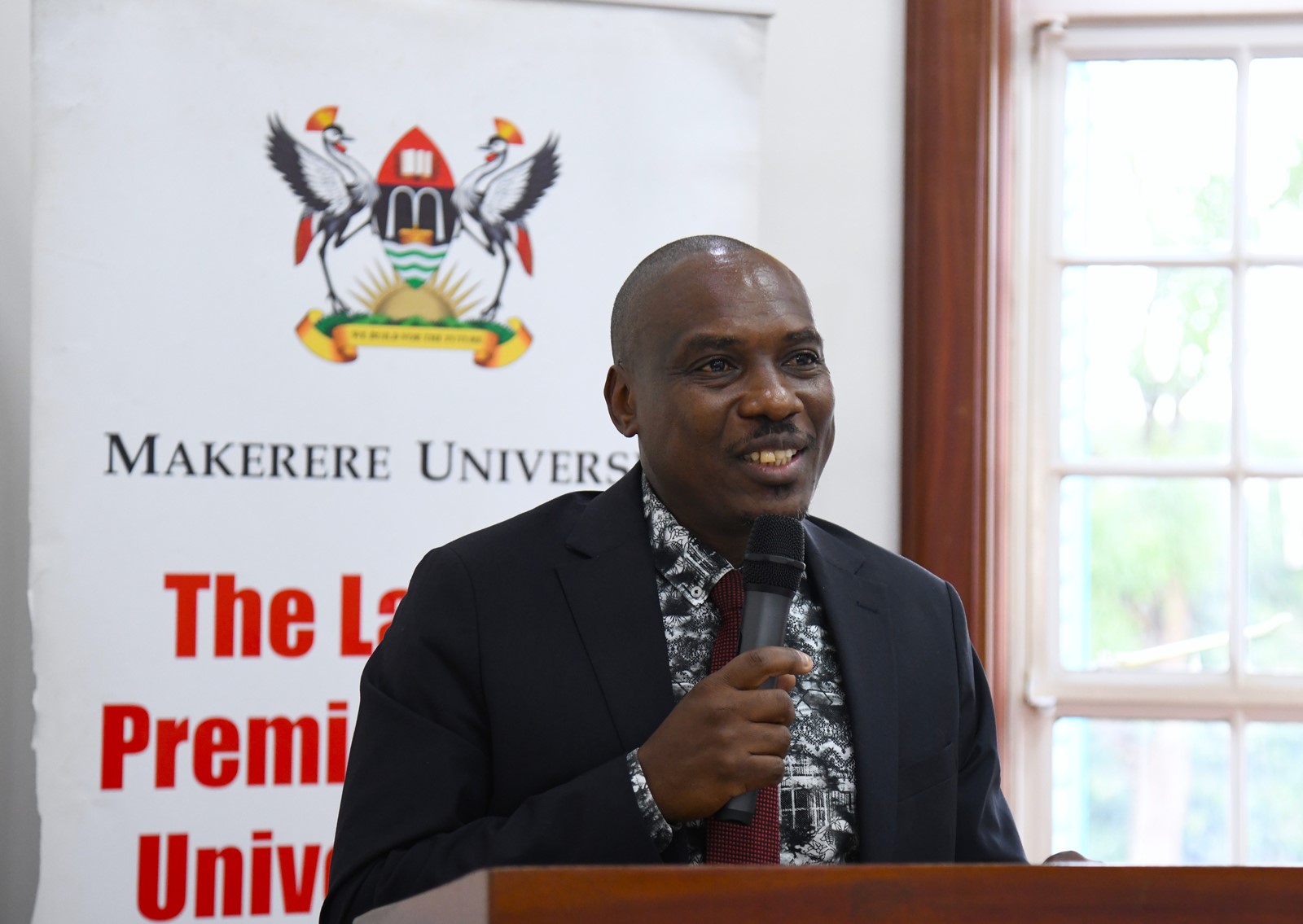
Prof. Robert Wamala, Director of the Directorate of Research, Innovation and Partnerships (DRIP), praised the CHUSS for the launch of five scholarly publications, emphasizing the dedication, intellectual rigor, and perseverance of the authors. He highlighted that these works—three books and a journal—demonstrate the critical role of the humanities and social sciences in shaping national development, informing public debate, and contributing to global discourse. Prof. Wamala commended the College for fostering a research environment that supports capacity building, collaborative networks, and high publishing standards, noting that the publications document African realities, preserve institutional memory, and provide knowledge that resonates locally and internationally. He encouraged continued scholarly collaboration, underscoring the university’s commitment to strengthening research governance and advancing its agenda as a leading center for African scholarship.

Prof. Helen Nambalirwa Nkabala, Principal of the College of Humanities and Social Sciences, warmly welcomed all attendees to the book launch, emphasizing the college’s pivotal role as the intellectual bridge connecting all other faculties at Makerere University. She acknowledged the presence and contributions of publishers, editors, management, and authors, noting that the success of such scholarly works relies on collaborative support across the University. Prof. Nkabala celebrated the dedication of homegrown talent, highlighting the importance of nurturing research, writing, and publication within the college. She also shared exciting updates on the establishment of the Office of Grants, Research Resource Mobilization, and Graduate Training, underscoring the college’s commitment to structured leadership, research excellence, and capacity building.

Celebrating Excellence: Contributions from University and Partner Publishers
Dr. William Tayeebwa, Head of Makerere University Press, celebrated a landmark day for the institution, highlighting the Press’s remarkable productivity and impact. He reflected on the recent launches, including Reinventing Uganda and Memory and Method for Material, and noted the impressive volume of over 15 publications released this year alone. Dr. Tayeebwa emphasized the Press’s commitment not only to publishing new works but also to republishing significant titles that have sold out globally, ensuring continued access to vital scholarship. A particular highlight was the revival of the Makerere Journal of Languages, Literature and Communication, which had not seen a publication since 1991; archival issues dating back to 1975 are now being digitized and made accessible online. He also stressed ongoing efforts to enhance the international visibility of the University’s journals through indexing and quality standards, underscoring the Press’s role in strengthening academic scholarship and advancing Makerere University’s global reach.
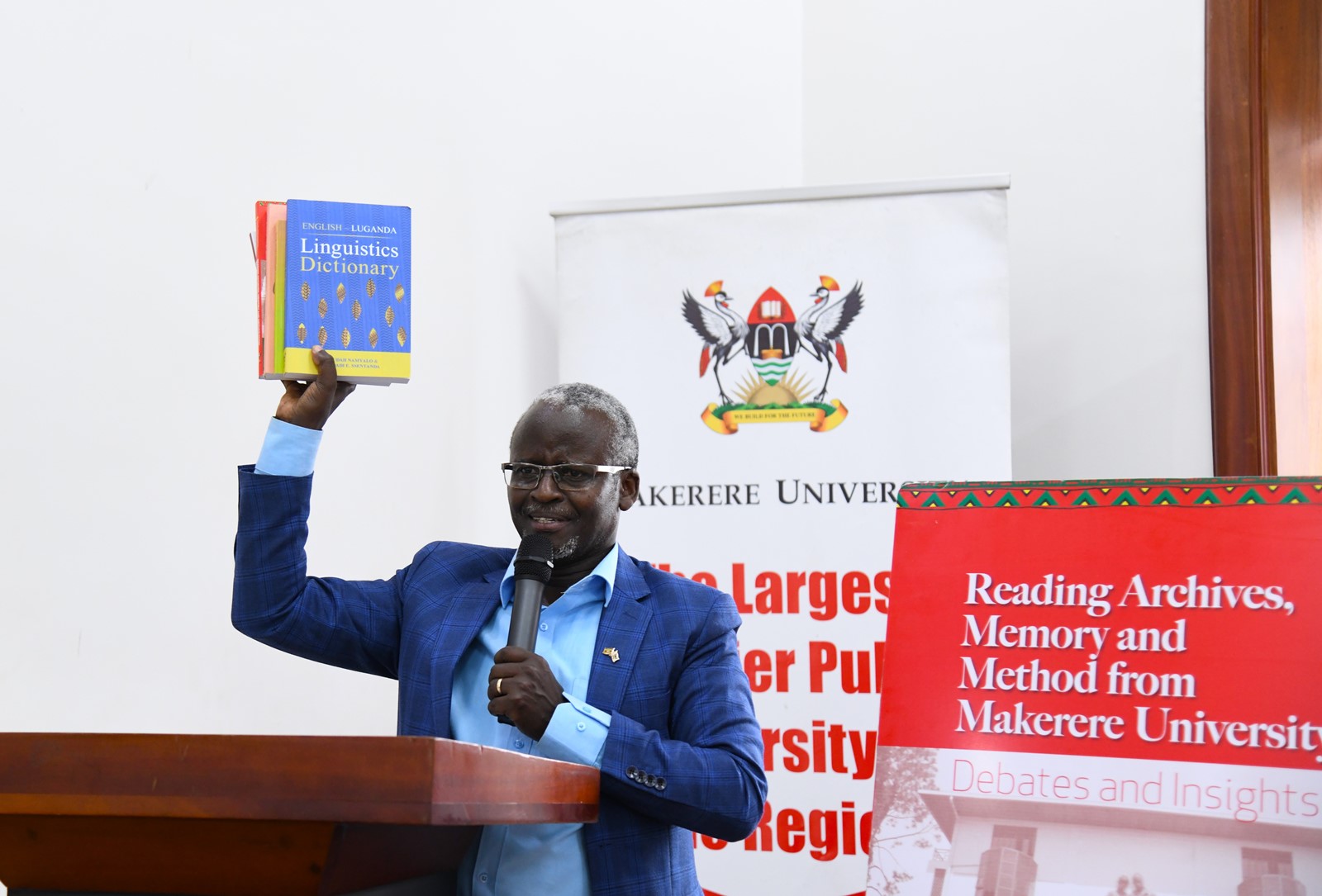
Speaking on behalf of Fountain Publishers, Mr. Tom Tibaijuka highlighted the long-standing partnership between the publishing house and Makerere University, noting the collaborative efforts that have helped nurture local scholarship. He emphasized that, despite the commercial nature of Fountain Publishers, their mission extends beyond profit to supporting scholarly contributions that enrich society. Mr. Tibaijuka praised the recently launched book, which features 12 chapters and 11 contributors, commending both the authors and the editorial team for their dedication in harmonizing such a complex manuscript. He noted the book’s alignment with the new competency-based curriculum promoted by the National Curriculum Development Authority, emphasizing its relevance in fostering critical thinking, innovation, and problem-solving skills in education. He concluded by congratulating all involved and encouraging educators and stakeholders to engage with the publication as a valuable resource for navigating contemporary educational challenges.

Prof. Rev. Sr. Dominica Dipio, representing the African Humanities Series Publisher, provided an overview of the series’ evolution and its impact on the continent’s humanities scholarship. She explained that the series began in 2014 as part of the African Humanities Program, initially supporting doctoral completion, before shifting focus to early-career mentorship to cultivate a new generation of humanities scholars. Over the past 15 years, the program has benefitted over 500 fellows across Uganda, South Africa, Nigeria, Ghana, and Tanzania, nurturing research and publications that address a wide range of humanities and social sciences disciplines, including philosophy, literature, languages, sociology, politics, and culture. Prof. Dipio emphasized that the series combines the experience of senior scholars with emerging voices, producing accessible, globally relevant work. She also highlighted an upcoming fellowship program designed to support early-career researchers for up to ten years, encouraging increased participation from Uganda to ensure broader engagement in the continent-wide initiative. The book being launched, she noted, exemplifies the series’ commitment to engaging, applied humanities that speak to everyday societal challenges, demonstrating the relevance and reach of African scholarship.
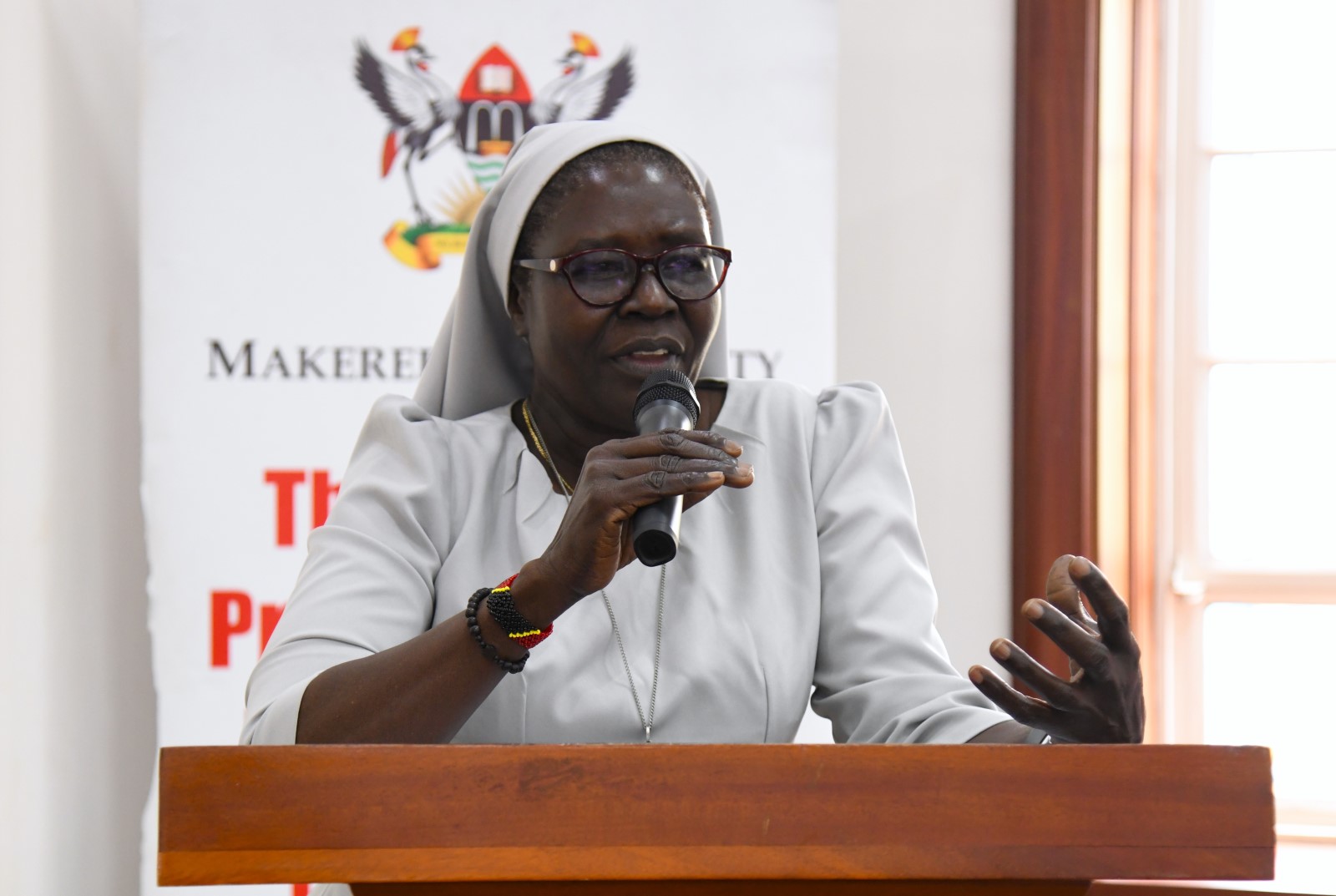
Championing African Scholarship and Knowledge Production
Prof. Josephine Ahikire, Principal Emeritus of CHUSS and Project Principal Investigator (PI) for Mellon Projects at Makerere University, emphasized the transformative role of the College’s publications in shaping African scholarship. She highlighted that these edited books and journals go beyond traditional metrics of academic recognition, creating vibrant scholarly communities where ideas are shared, debated, and collaboratively developed. Prof. Ahikire noted the importance of centering African-generated knowledge, reclaiming histories, and exploring underrepresented topics such as the social and cultural dimensions of motherhood. She applauded the project teams for their dedication and collaboration, describing the 2025 book launches as the beginning of a broader effort to document and disseminate African perspectives, ensuring that the continent’s intellectual contributions are recognized, celebrated, and preserved for future generations.
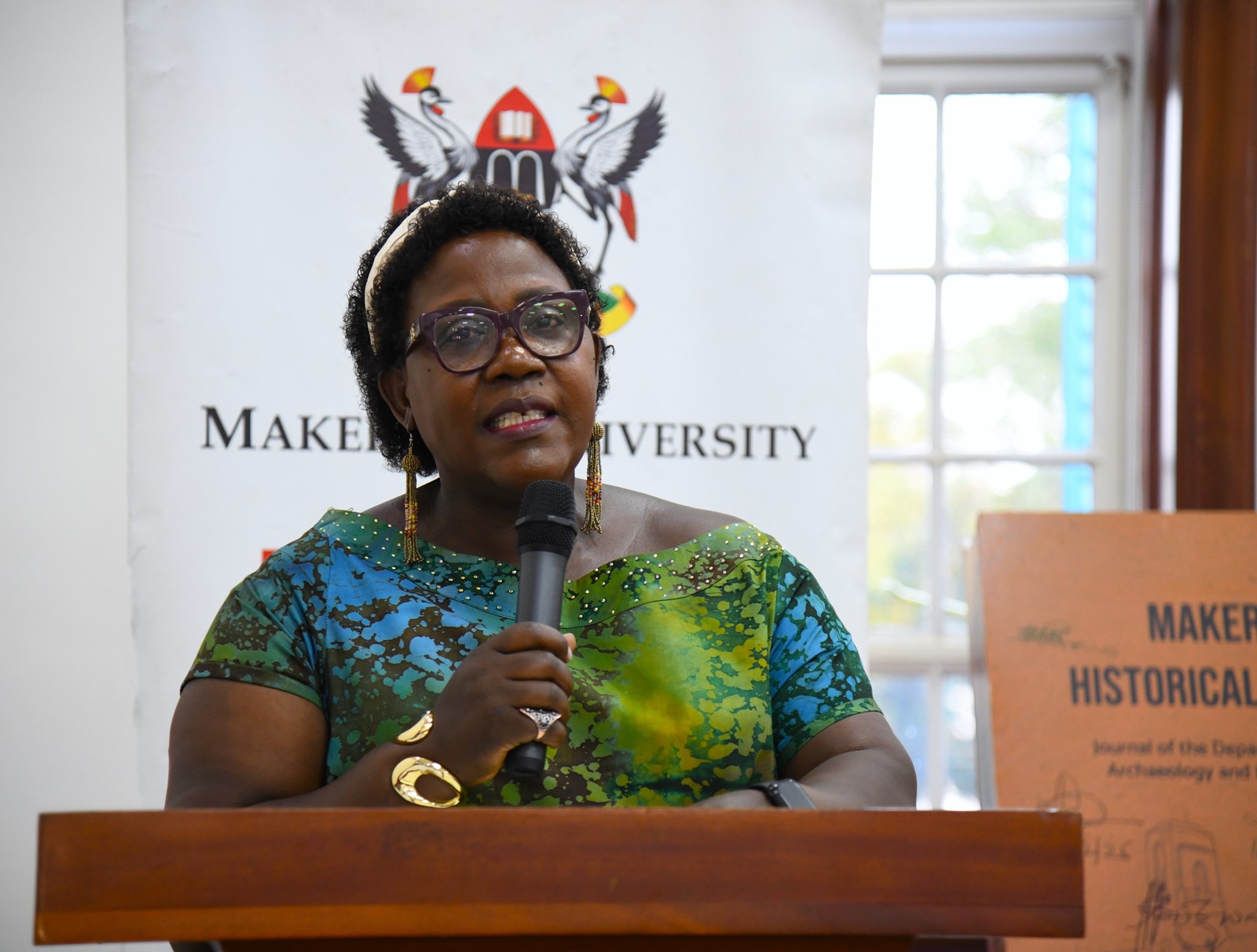
Prof. Andrew Elias, Director of the Centre of Excellence in Research, Teaching and Learning (CERTL), highlighted the critical relevance of the book Reclaiming Learning: Struggles and Innovations in Higher Education, noting that it arrives at a pivotal moment for Ugandan universities. He emphasized that growing enrollment, limited resources, and structural challenges—including large class sizes, inadequate facilities, and unequal access to online learning—have impacted the quality of education. The book, he noted, not only validates these shared experiences but also showcases innovative practices by Ugandan lecturers, from contextualized teaching methods to active learning strategies and the use of indigenous knowledge. Prof. Elias underscored that meaningful educational change requires institutional support, inclusive policies, and professional development, reminding stakeholders that effective pedagogy is a shared responsibility. The volume, he concluded, serves as both a practical guide and an inspiration for educators, policymakers, and institutions seeking to place students at the center of learning while promoting justice, inclusion, and human dignity in higher education.
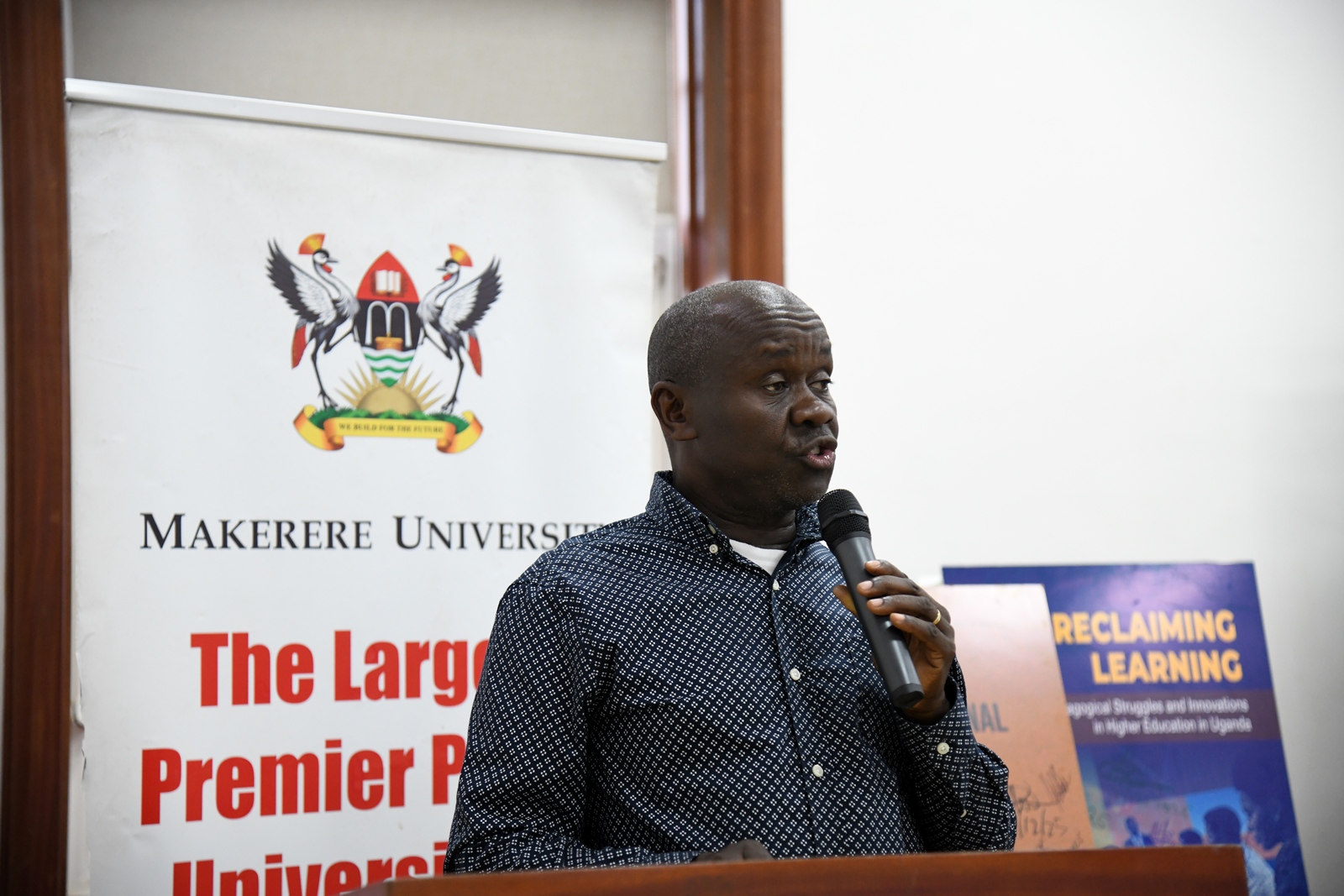
The Five Publications and Their Impact
Reclaiming Learning: Pedagogical Struggles and Innovations in Higher Education in Uganda (Prof. Andrew Ellias State et al.) explores student-centred teaching and innovative approaches in African higher education, supported by the Mellon Foundation through CERTL.
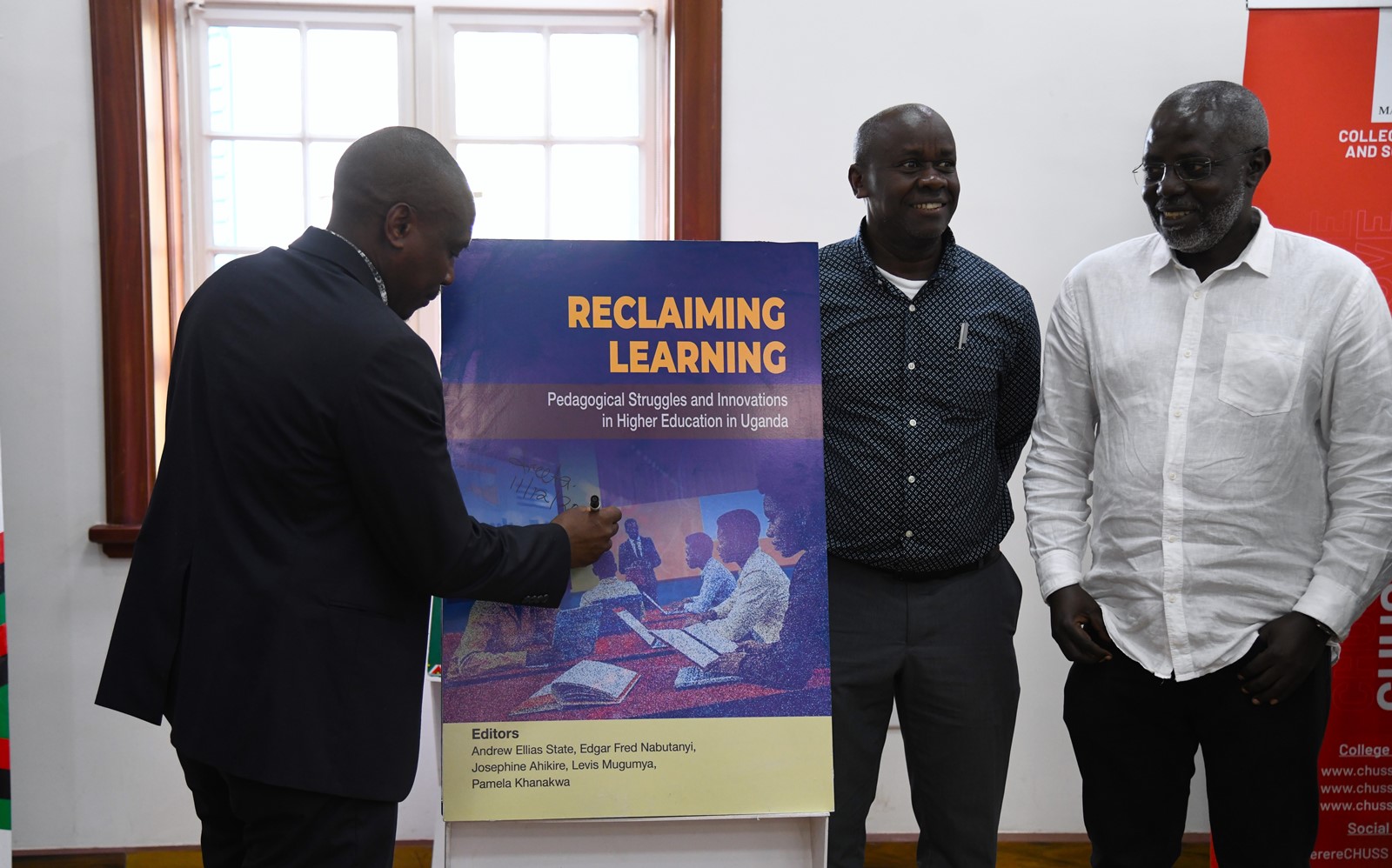
Reading Archives, Memory and Method from Makerere University (Assoc. Prof. Edgar Nabutanyi, Dr. Amon Ashaba Mwiine, Prof. Josephine Ahikire, Dr. Edgar Taylor, Dr. Pamela Khanakwa, and Dr. Levis Mugumya, highlights the importance of archives and memory in shaping scholarship and reclaiming African narratives, funded by the Mellon Foundation’s AMM project.
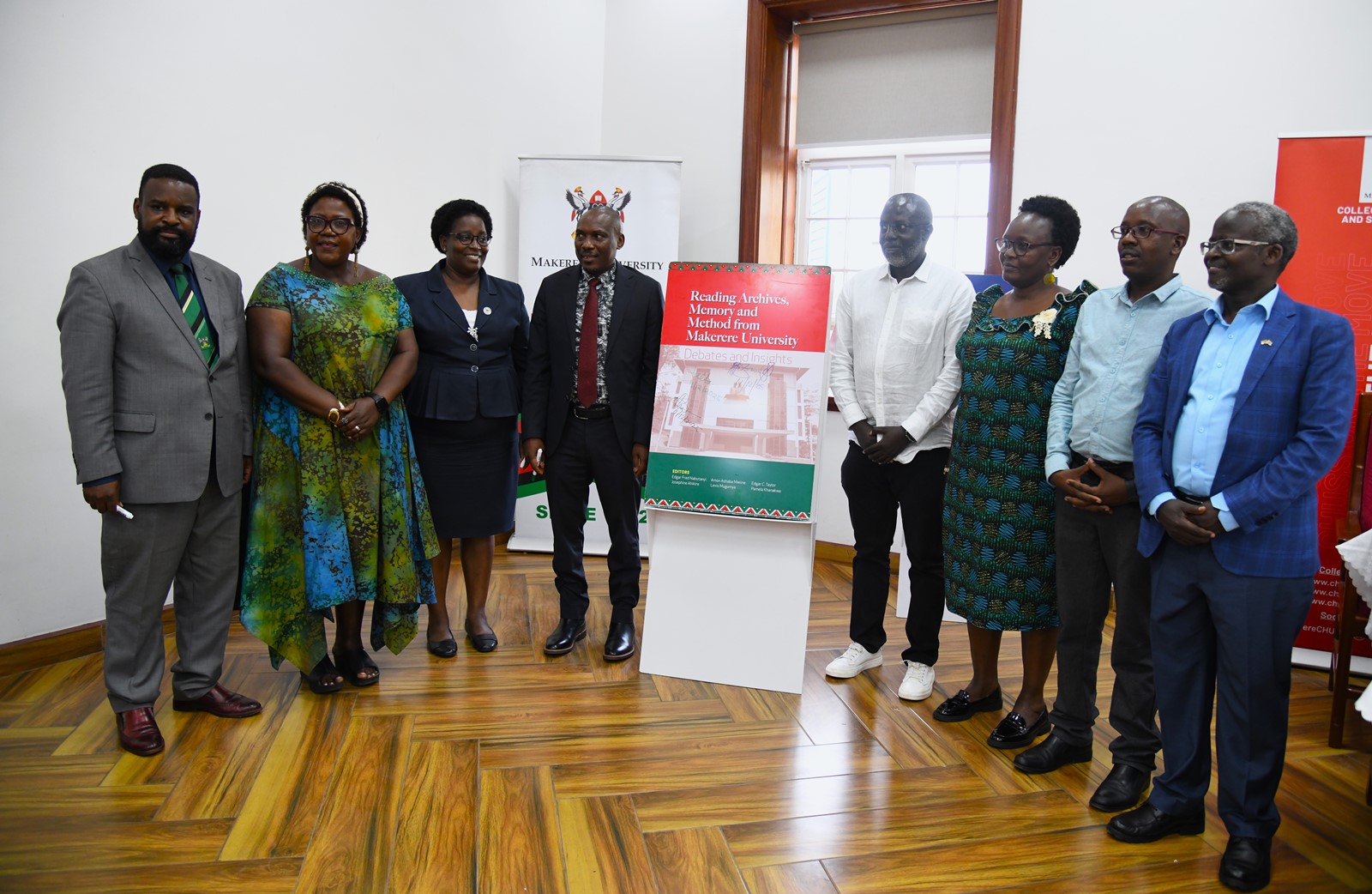
Living with Others: Ethnic Conflict and Pluralism in Uganda’s Greater Kibaale Region (Dr. Jimmy Spire Ssentongo) examines identity, conflict, and co-existence, offering insights toward social justice and peaceful co-living, supported by the African Humanities Foundation.
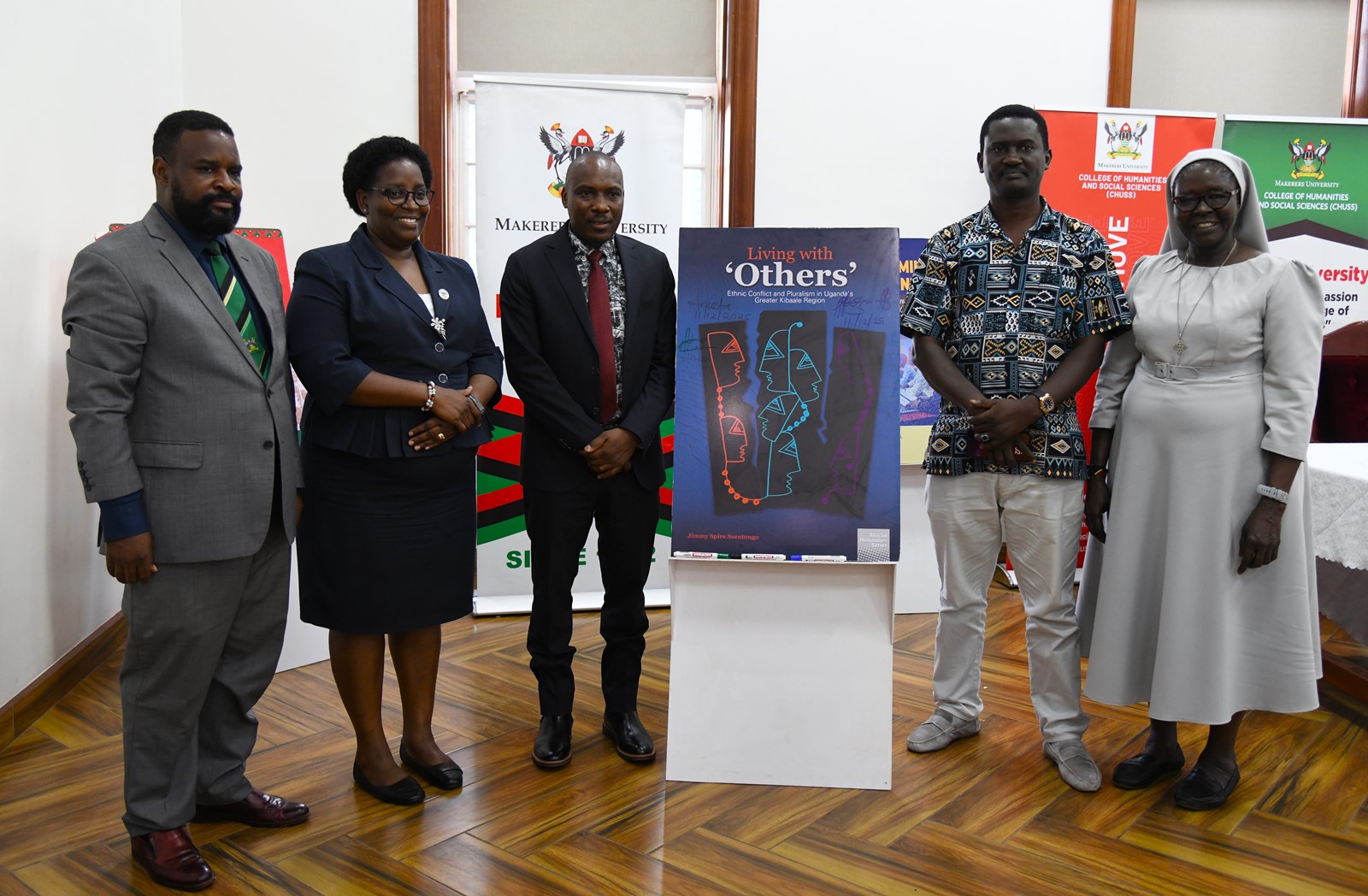
The Makerere Historical Journal (Vol. 6, No. 1, 2025) (Deo Katono, Rebecca Glada, Edgar Taylor, and Christopher Muhoozi.) continues the university’s tradition in historical scholarship, nurturing emerging scholars and deepening debates, published by Makerere University Press.
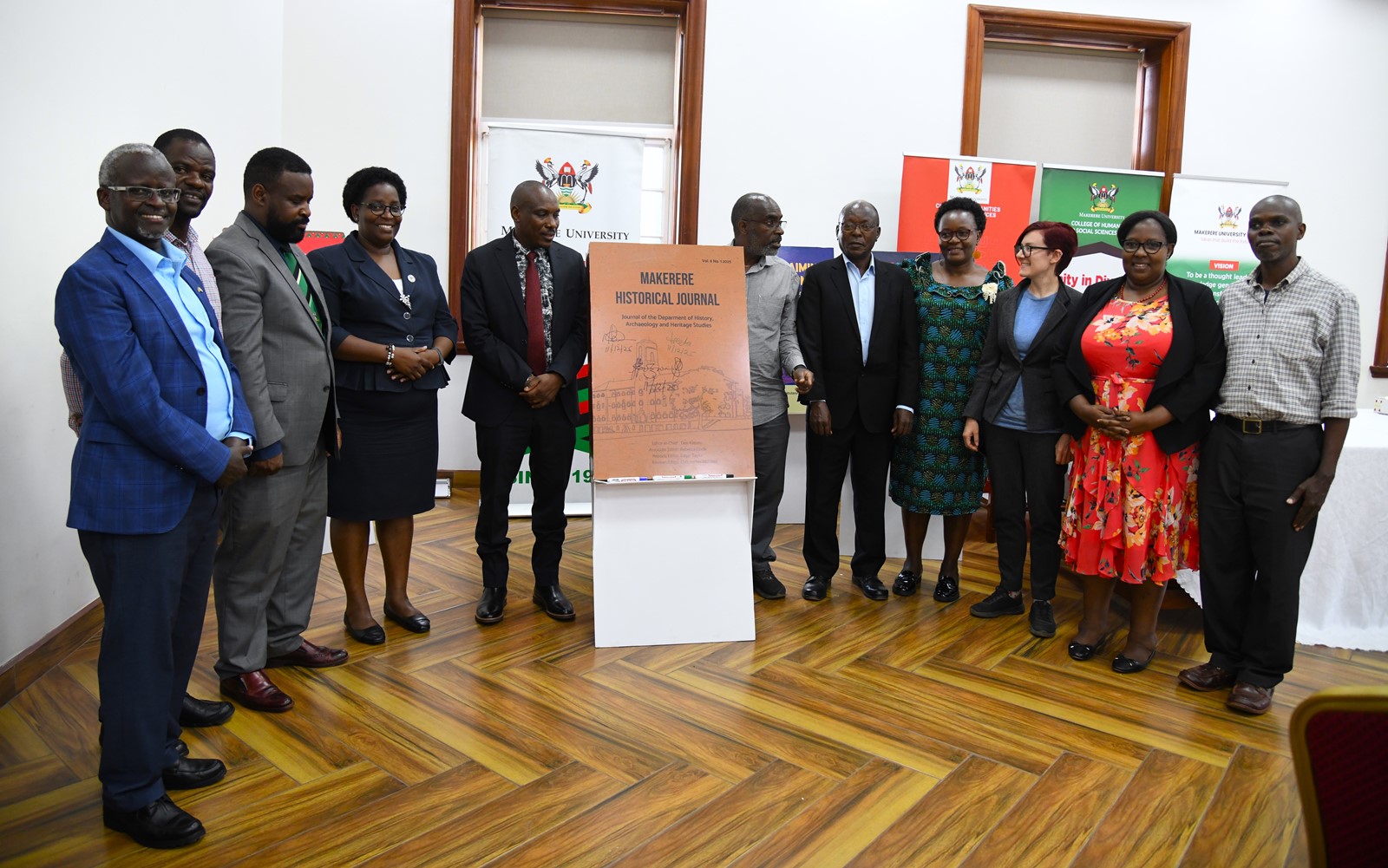
Makerere Journal of Languages, Literature and Communication (Vol. 1, Issue 1) which is the inaugural issue marks a milestone for the School of Languages, Literature and Communication (SLLC), promoting cross-disciplinary dialogue, with support from the Center for Languages and Communication Services and Makerere University Press.
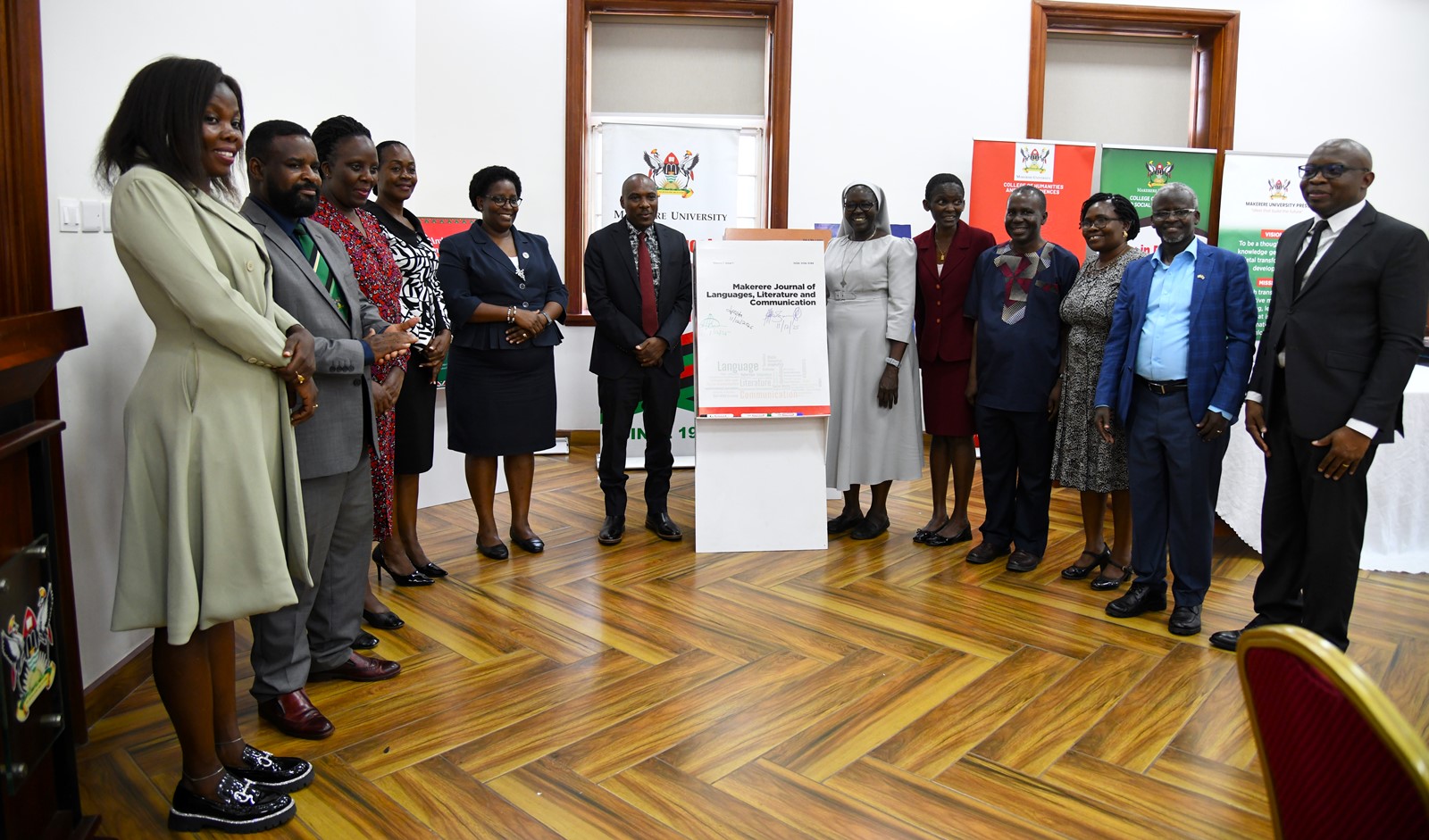
Humanities & Social Sciences
Makerere University Press launches a Groundbreaking Book “Gender, Social Norms and Agency: Perspectives from East Africa,” Sparking a New Era of Collaborative Action for Gender Equality in the Region
Published
2 months agoon
November 20, 2025By
Mak Editor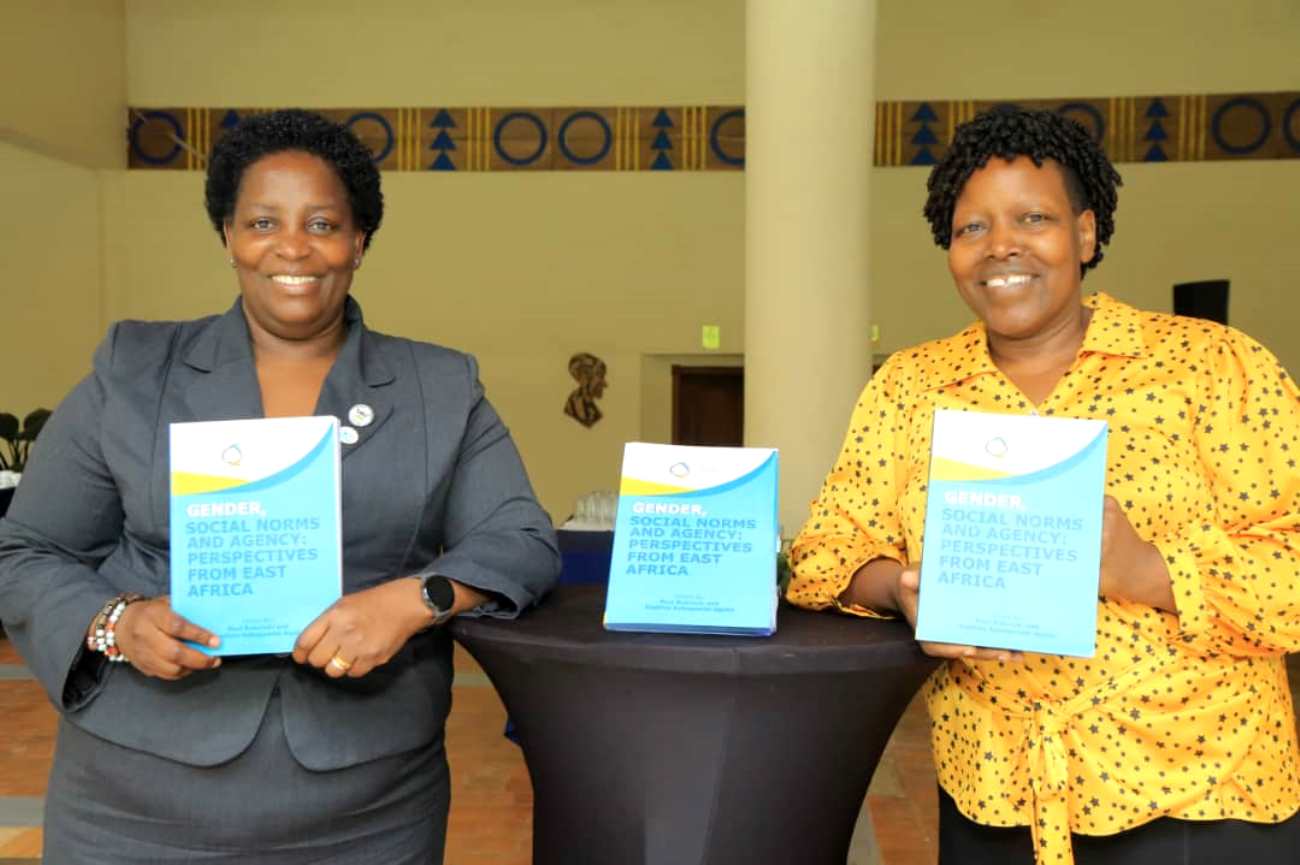
By Wilber Tumutegyereize
Kampala, Uganda — In a significant event that fused academia with practical activism, Makerere University Press launched the highly anticipated book “Gender, Social Norms and Agency: Perspectives from East Africa” at the Golf Course Hotel in Kampala. Edited by Professor Paul Bukuluki and Dr. Daphine Agaba Kabagambe. this book represents a crucial contribution to the field of gender studies, focusing on the complex interplay between gender, social norms, and agency across East Africa.
The book’s launch brought together scholars, development practitioners, and activists who are committed to advancing gender equality, social justice, and transformative change in the region. It marks a pivotal moment in the ongoing dialogue around gender, social norms, and how these deeply rooted cultural forces shape the experiences of women, men, and marginalized groups in East Africa.
Mr. Aloysius Nyombi, the Technical Advisor, Social Norms. As a key partner in the creation of the book set the tone for the evening by celebrating the collaborative efforts that brought together a diverse group of researchers and practitioners.
“The launch of this book is a celebration of collaboration,” Nyombi stated. “We are here not just to celebrate an academic achievement, but also to honor the work that’s being done in communities across East Africa. What we are doing on the ground must be documented, and it must be accessible to all.”
Nyombi’s comments highlighted the importance of bridging the gap between research and real-world application, underscoring the value of such academic works for informing policy and driving social change. His emphasis on collaboration between researchers, NGOs, and practitioners reinforced the book’s focus on addressing gender-related issues in a tangible and actionable way.
The Power of Local Expertise:
Dr. Ruth Nsibirano, The Director of the Institute of Gender and Development Studies at Makerere University spoke passionately about the significance of the book in deepening the understanding of gender norms within the East African context. She stressed the need for locally relevant research that reflects the lived experiences of communities.
“This book is not just an academic publication; it is a tool for social change,” Dr. Nsibirano said. “It provides us with a critical lens through which we can examine the norms and practices that continue to shape gender roles in our societies. Understanding these dynamics is crucial for making lasting change.”
Dr. Nsibirano emphasized the importance of the book’s multidisciplinary approach, which brings together academic scholars, field practitioners, and activists to create a well-rounded narrative. Her reflections resonated deeply with the audience, who were united in their shared commitment to gender equality.
A Vision for Collaborative Academia
Professor Helen Nambalirwa Nkabala, the Principal of Makerere University’s College of Humanities and Social Sciences underscored the importance of institutional support and collaboration in academic publishing. Representing the Chief Guest, Professor Sarah Ssali, the First Deputy Vice Chancellor (Academic Affairs) at Makerere University, Professor Nkabala conveyed her pride in the academic community’s collective effort to produce the book.
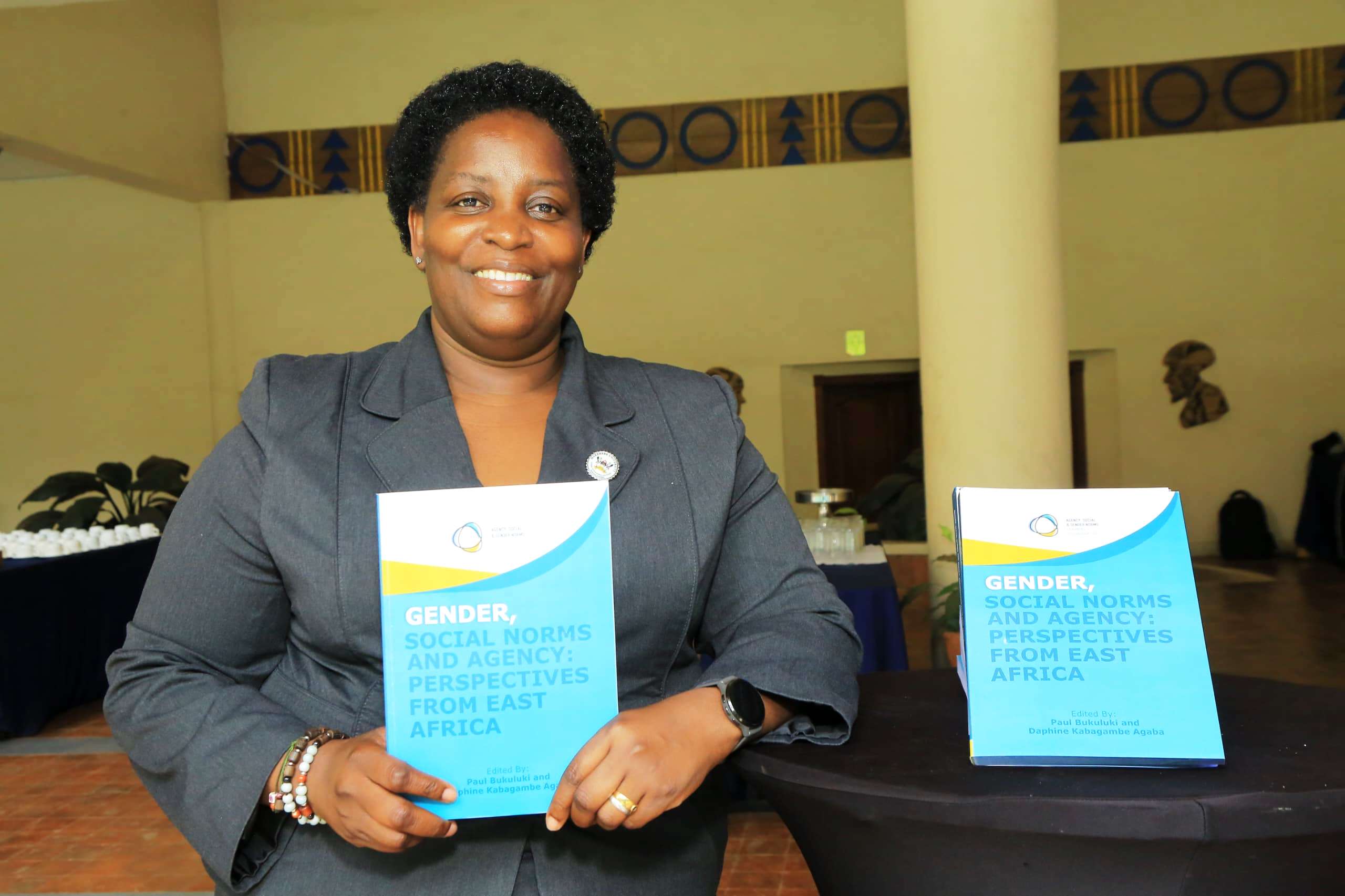
“It is an honor to be part of this project, which is a true reflection of the collaborative spirit at Makerere University,” Professor Nkabala said. “This book is a testament to the commitment of our researchers, students, and faculty members who are dedicated to addressing the most pressing social issues of our time.”
Professor Nkabala spoke about the increasing urgency to address issues such as unpaid care work, child marriage, and violence against women, topics that the book explores in depth. She praised the book for its holistic approach, combining theory and practice to offer insights that can be directly applied to social and policy interventions.
“The power of this book lies in its ability to challenge harmful gender norms and provide solutions that can transform societies,” she said.
The book’s co-editors, Dr. Daphine Agaba Kabagambe and Professor Paul Bukuluki, who shared the journey of bringing the book to fruition, expressed their deep commitment to shedding light on the social norms that influence gender behavior in East Africa and how such norms can be transformed for greater gender equality.
Dr. Agaba Kabagambe, a senior lecturer at Makerere University, reflected on the importance of examining how social norms in East Africa influence the lives of women, men, and children. She noted that while much of the discourse around gender focuses on laws and policies, there is still a significant gap in understanding how entrenched norms and cultural practices impact the real-life experiences of individuals.
“We wanted this book to serve as both a scholarly resource and a practical guide for those working to change societal behaviors,” Dr. Agaba Kabagambe explained. “The research inside this book offers a deeper understanding of how gender and social norms shape our world, and it provides us with tools to challenge and change those norms.”
Professor Bukuluki, expanded on the book’s focus on action-oriented research. He noted that while the book provides theoretical insights into gender norms and agency, it also includes valuable contributions from field practitioners working in communities across East Africa. These chapters are crucial for bridging the gap between academia and the grassroots work being done to promote gender equality.
“This book reflects the intersection between theory and practice,” Professor Bukuluki explained. “We wanted to include not only the academic perspective but also the voices of those who are working in the field, dealing with the realities of gender inequality on a daily basis.”
The book is structured around 13 chapters that explore themes such as unpaid care work, the impact of technology on gender roles, and communication about sexuality. These chapters bring together academic theory with practical insights from development practitioners and community leaders across Uganda, Tanzania, Kenya, and beyond.
The Role of Makerere University Press
Mr. Elvis Lubanga, representing Dr. William Tayebwa, the Chief Managing Editor of Makerere University Press, highlighted the press’s pivotal role in bringing the book to life. Lubanga’s remarks underscored the importance of publishing local research that meets international academic standards while remaining grounded in the realities of East African communities.
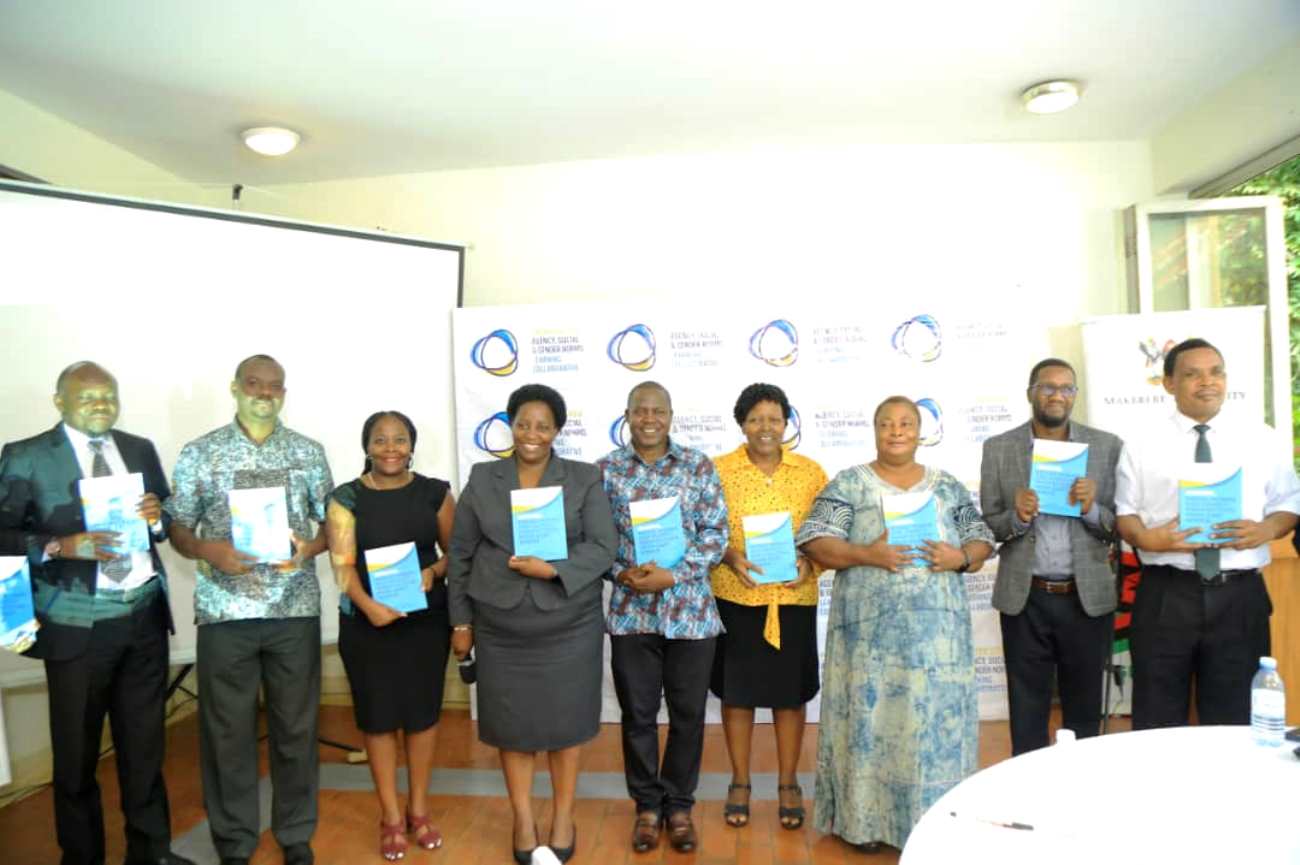
“At Makerere University Press, we take pride in producing works that reflect the unique challenges and opportunities of the Global South,” Lubanga said. “This book is not just an academic text; it is an important contribution to the ongoing conversation about gender equality and social transformation.”
Lubanga emphasized the press’s commitment to ensuring that local knowledge and research are accessible to global audiences, while also supporting the work of local scholars. He noted that the book is available both in print and online, making it accessible to readers across East Africa and the wider world.
Dr. Aramanzan Madanda representing Mr. Apolo Gabazira the Country Director of CARE International Uganda, shared the organization’s appreciation for the book, noting how it aligns with CARE’s mission to empower women and girls and address gender-based inequalities in East Africa.
“CARE Uganda has long been committed to addressing the root causes of gender inequality,” Dr. Madanda said. “This book is a crucial tool for organizations like ours, helping us better understand the social norms that perpetuate gender-based violence and other forms of inequality.”
Mr. Yiga Deo, Executive Director of the Impact and Innovation Development Center (IIDC), highlighted the importance of bridging the gap between academic research and community action, emphasizing that sustainable gender equality requires locally informed, innovative approaches. Mr. Deo urged collaboration between universities, civil society, and policymakers to ensure that research informs real-world interventions. He called for a reimagining of development practices that center on culture as a foundation for progress, ensuring that knowledge translates into lasting, transformative change.
Through the launch of “Gender, Social Norms and Agency: Perspectives from East Africa”, Makerere University Press has provided a much-needed resource that will inspire further research, action, and policy reform. The book’s insights will not only enrich the academic community but also inform the work of development practitioners, policymakers, and activists who are striving to create a more just and equal East Africa.
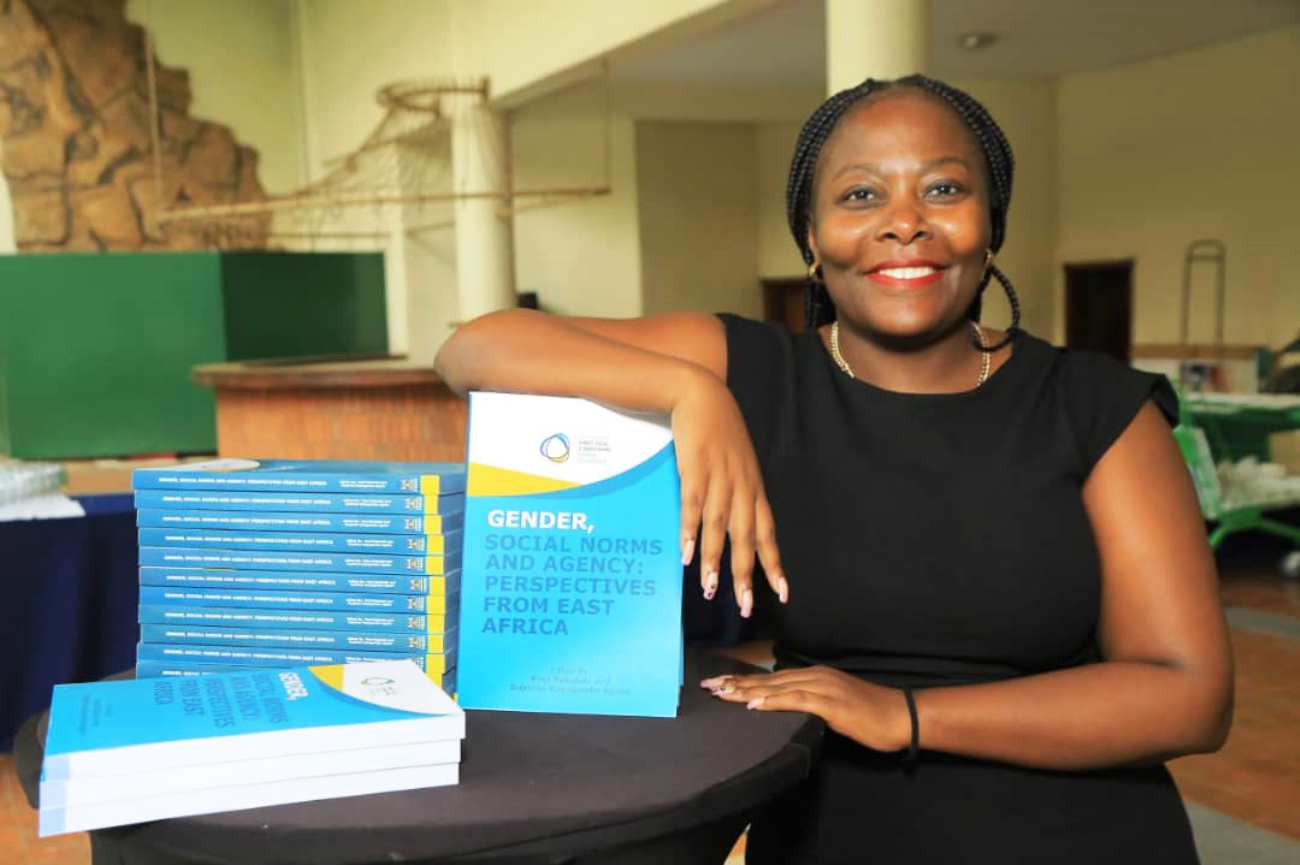
As Dr. Daphine Agaba Kabagambe aptly stated, the book is a “bridge between theory and practice,” and it will undoubtedly be an essential resource for anyone committed to understanding and challenging the social norms that shape gendered behavior across East Africa.
The launch of “Gender, Social Norms and Agency: Perspectives from East Africa” is a landmark moment in the ongoing quest for gender equality and social justice in the region. With contributions from leading scholars, development practitioners, and gender experts, this book provides an invaluable resource for those seeking to understand and transform the gendered social norms that impact millions of lives in East Africa. The collaboration betweenMakerere University Press, scholars, and community-based organizations highlights the importance of a unified effort to address the region’s most pressing gender-related issues.
Through its innovative approach, combining theory and practice, this book promises to be a catalyst for change in the fight for gender equality and social transformation across East Africa.
Humanities & Social Sciences
Hon. Mao Urges African States to Institutionalise Accountability in Governance
Published
2 months agoon
November 20, 2025By
Jane Anyango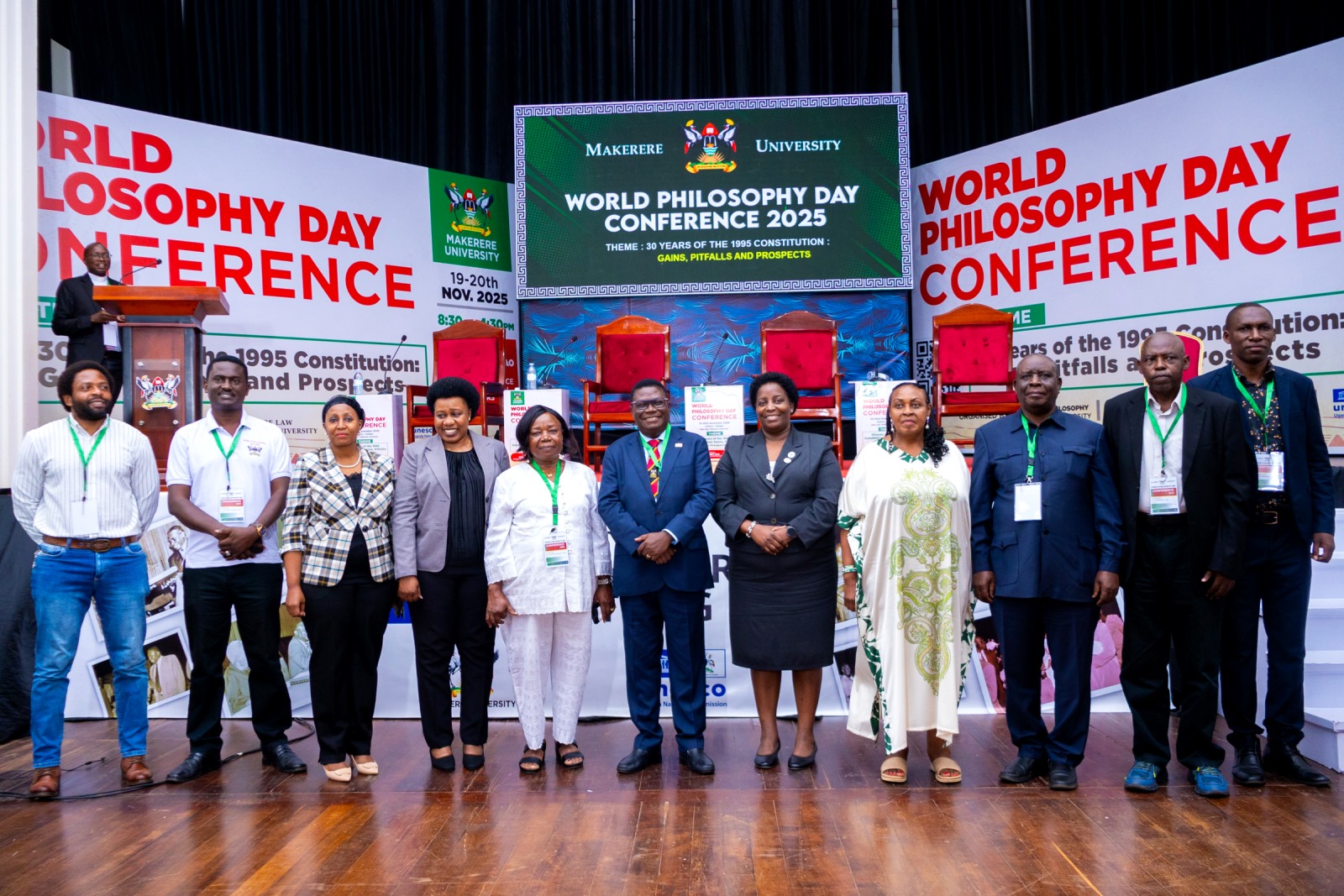
By Jane Anyango and Zaam Ssali
Minister of Justice and Constitutional Affairs, Hon. Nobert Mao, has urged Uganda and other African countries to adopt governance systems that firmly entrench accountability and civil liberties at all levels of leadership.
Mao made the call on Wednesday while presiding as Chief Guest at the World Philosophy Day celebrations held at Makerere University. The two-day conference, running from 19th–20th November 2025, was organized by the Department of Philosophy in collaboration with the School of Law, UNESCO and the Konrad Adenauer Stiftung under the theme: “30 Years of the 1995 Constitution: Gains, Pitfalls and Prospects.”
The event, hosted in a hybrid format at the Makerere Main Hall, featured academic papers, screenings of Constituent Assembly debates, panel sessions with drafters of the Constitution, creative performances and exhibitions on Uganda’s constitution-making journey.
Mao warned that Africa’s current political systems risk turning leadership terms into ritualistic cycles where leaders serve five-year mandates without meaningful public accountability. He argued that genuine democracy must be tied to transparent governance, citizen oversight and an environment where civil liberties are respected.
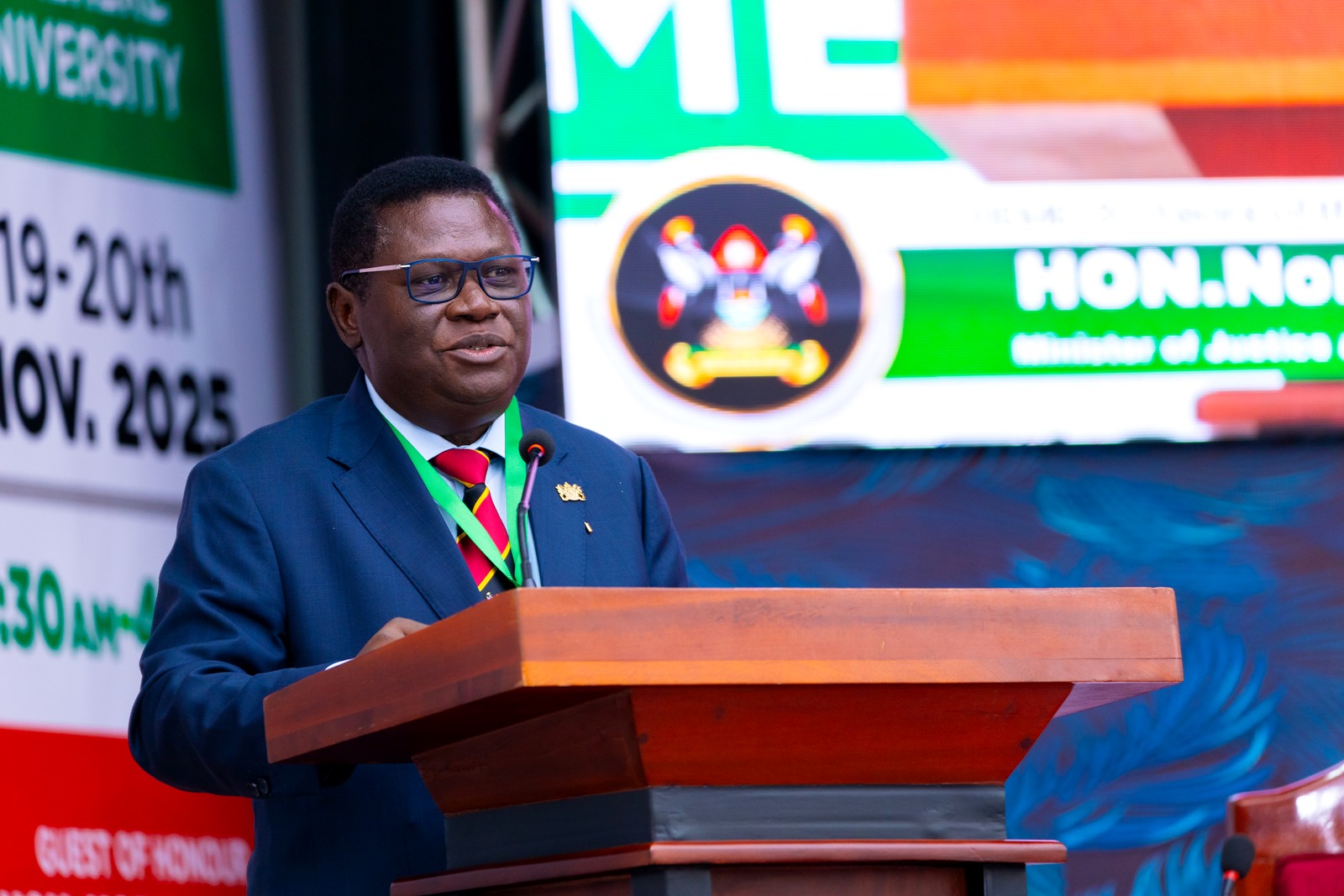
“We need to balance accountability and civil liberties with national unity and stability,” Mao said, dismissing claims that demanding civil liberties threatens peace. “That is a false dichotomy. A government can be both accountable and stable.”
He stressed that Ugandans must remain free to speak openly about governance failures, injustices and past atrocities, noting that national healing requires courage to confront uncomfortable truths. He also cautioned political actors against manipulative tribal politics, calling for a shift toward consensual and tolerant political engagement.
Mao challenged universities to take the lead in deepening political discourse, saying academia must dissect complex national issues and guide public understanding. “If there is one place where citizens should discuss even the most contentious subjects, it is a university,” he said, praising Makerere University for fostering open inquiry.
Reflecting on the 30-year journey of the 1995 Constitution, Mao noted that while it remains “an infant,” it has endured significant tests, including violations of land rights and widespread public concerns about inadequate protection of marginalized groups. However, he welcomed the judiciary’s role in striking down unconstitutional provisions in laws such as the Police Act and the UPDF Act.
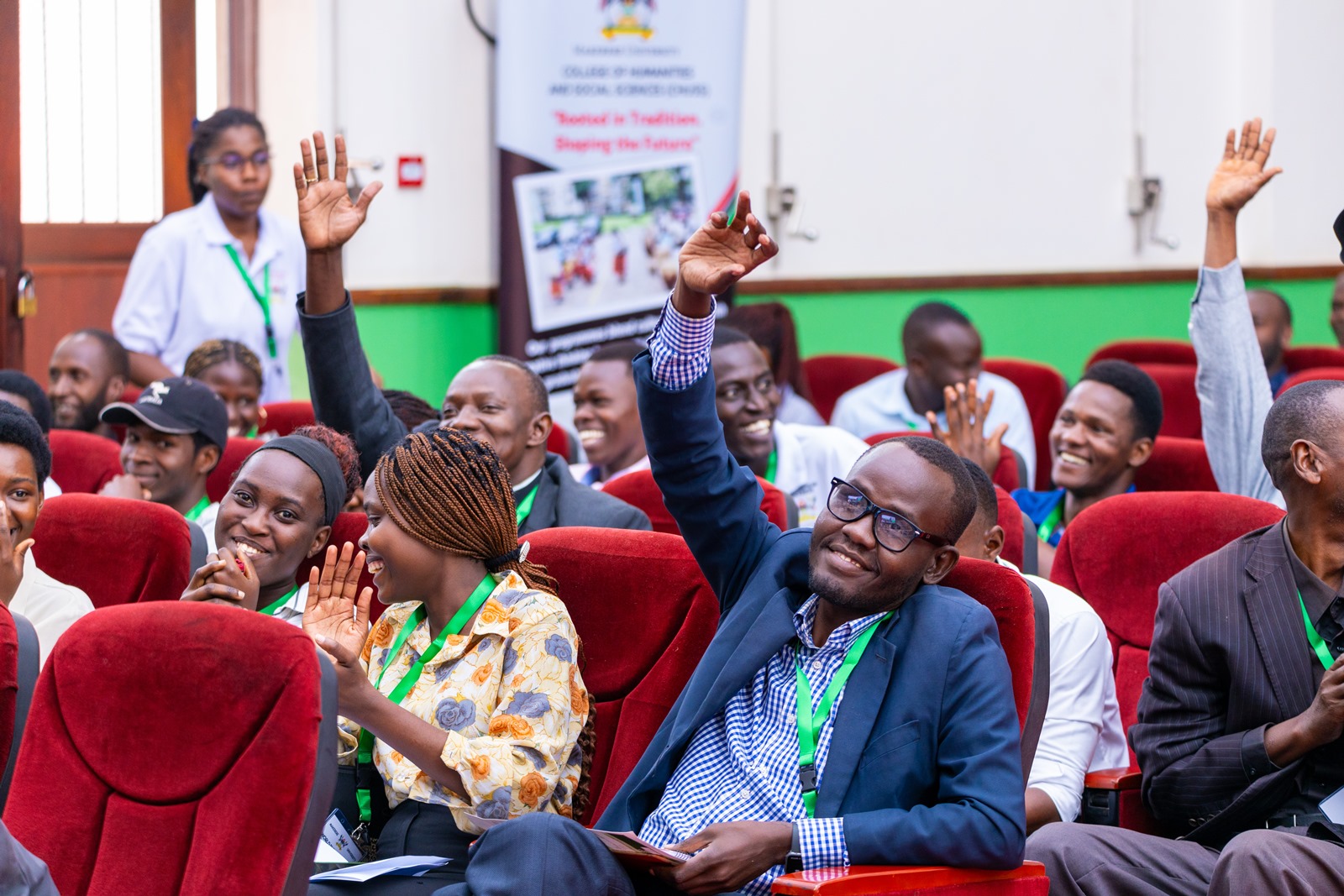
Looking ahead, Mao emphasized that the real test of Uganda’s constitutionalism will be the country’s ability to achieve a peaceful transition of political power — a milestone he described as crucial for democratic maturity.
He concluded by urging citizens to uphold their civic duty in shaping political culture across Uganda and the continent, saying: “Citizens have an obligation to shape the minds of those who participate in politics.”
VC Hails Makerere’s Historic Role in Shaping Uganda’s Constitutional Journey
Delivering the Vice Chancellor’s message on behalf of Prof. Barnabas Nawangwe, Prof. Helen Nambalirwa Nkabala said the university was proud to host the commemoration under the timely theme, “30 Years of the 1995 Constitution: Gains, Pitfalls and Prospects.” She emphasised that the gathering provides an essential platform for citizens, scholars and practitioners to interrogate one of the most significant instruments in Uganda’s governance architecture.
Prof. Nkabala conveyed the Vice Chancellor’s appreciation for the interdisciplinary nature of the conference, which brings together academics, constitutional drafters, philosophers, legal scholars, creatives and the general public for collective reflection. She noted that the 1995 Constitution remains central to Uganda’s political, social and economic landscape, and that 30 years on, the country stands at a critical juncture to assess its relevance and durability.
Highlighting Makerere University’s indispensable role in shaping Uganda’s constitutional evolution, she recalled that several of the nation’s most influential constitutional thinkers were Makerere academics. These include Prof. Frederick Ssempebwa, Dr. Dan Mudoola, Prof. Phares Mutibwa, Mwambusya Ndebesa and Prof. James Kigongo, all of whom made direct contributions to the crafting of the 1995 Constitution. Their involvement, she said, reflects the university’s longstanding commitment to national development, political thought and ethical leadership.

According to the Vice Chancellor, Makerere continues to advance constitutional scholarship through teaching and research in human rights, ethics, political philosophy, critical thinking and governance. The School of Law, Prof. Nkabala noted, remains an anchor in nurturing legal minds through robust constitutional law training, shaping professionals who contribute directly to Uganda’s governance processes.
She thanked UNESCO and the Konrad Adenauer Stiftung for supporting the event and for their continued partnership with Makerere in strengthening philosophical inquiry, democratic governance and academic freedom. The Vice Chancellor also commended the organising committee for assembling a rich programme featuring academic papers, screenings of Constituent Assembly debates, exhibitions and reflective performances.
The Constitution is a Document of Life- Prof. Helen Nkabala
Speaking in her own capacity as Principal of the College of Humanities and Social Sciences (CHUSS), Prof. Nkabala praised the Department of Philosophy for sustaining intellectual vibrance within the college. Describing the department as a “beehive,” she noted that it had already hosted three major reflective events this year—each aimed at deepening national dialogue on governance, ethics and social cohesion.
She reaffirmed the value of the humanities in shaping societies, especially at a time when they face diminishing global attention. She said UNESCO and Konrad Adenauer Stiftung had played an invaluable role in elevating philosophical and humanities-based conversations that influence national decision-making.
Referencing Jawaharlal Nehru, Prof. Nkabala reminded participants that a constitution is “a document of life” whose meaning, strength and sanctity must be tested continually through informed debate, societal engagement and scholarly critique.
She argued that reflecting on 30 years of Uganda’s Constitution requires examining both its successes and limitations, acknowledging that age brings opportunities for wisdom but also exposes emerging challenges.
Prof. Nkabala further applauded Makerere management for providing space and institutional support for critical conversations, noting that such platforms ensure that universities remain central to shaping national identity, governance and collective aspirations.
Academics Must Lead Renewal of Uganda’s Constitution Amid Weakening Checks and Balances – Dr. Zahara Nampewo
Delivering remarks on behalf of the Dean of the School of Law, Deputy Dean Dr. Zahara Nampewo emphasized that constitutions are more than legal documents—they are ideological and political texts that rely on the will of the state for enforcement.

“Constitutions are not just legal documents. They are ideological and political texts. And therefore they are only as strong as the will of states to enforce their provisions,” she said.
She observed that Uganda’s Constitution has undergone numerous amendments that have weakened its original balance of power and checks and balances, undermining guarantees such as equality, democracy, social justice, and progress.
“Today, however, it has undergone the surgical knife a number of times with the result that the balance and distribution of power…have in reality been emasculated,” Dr. Nampewo said.
The Deputy Dean urged scholars to use their expertise to strengthen the Constitution and foster a culture of transformative and progressive constitutionalism. “As academia, we have a social function to contribute to its enforcement and strengthening because the past is never past,” she stated.
She also cited historical lessons, referencing George Washington’s caution on constitutional amendments: “Though Congress had the power to amend the Constitution, this was a power that should be used sparingly and only in the clearest of cases.”
Dr. Nampewo concluded with a call for collective action: “Alone, we are fragile, like butterfly wings. But when we flap those wings all together, that’s when we make a storm.”
Philosophical Reflection Central to Evaluating Uganda’s Constitutional Progress – Dr. Dickson Kanakulya
Dr. Dickson Kanakulya, Head of the Department of Philosophy, highlighted the philosophical and jurisprudential roots of constitutionalism, stressing that the 1995 Constitution emerged to address post-colonial challenges such as poor governance, poverty, and weak social cohesion.
“The 1995 Constitution was made purposely to address the challenges Uganda faced…including issues of bad governance, poverty, poor or weak social cohesion among others,” he said.

Dr. Kanakulya traced constitutional ideas to classical philosophy, noting the ongoing debate between Plato, who argued society should be led by virtuous leaders, and Aristotle, who insisted that good laws shape good citizens. “Aristotle observed that good laws make good men. While Plato argued that good men make good laws and good policies,” he explained.
He described the conference as a platform for critical assessment of the Constitution’s 30-year journey. “This conference gives us the opportunity to make a critical assessment of how far we have gone for the last 30 years. Obviously there are gains, there are challenges, there are prospects and we need to take stock of all these,” he said.
Dr. Kanakulya also highlighted the importance of collaboration, praising UNESCO, the Konrad Adenauer Stiftung, Makerere University leadership, and faculty for supporting the event. “This collaboration between the School of Law, Department of Philosophy and Conrad plus UNESCO is a very welcome growth and development…and we want to thank their generous support, both moral and financial,” he said.
He conveyed the commitment of the School of Liberal and Performing Arts to fostering critical thinking and liberal ideas: “The School of Liberal Performing Arts is committed to shape the minds of men today. We are a liberal school and we allow liberal thinking.”
Constitutional Drafters and Constitutional Assembly Members give context
A Panel Discussion comprised of Prof. Fredrick Ssempebwa, Hon. Hope Mwesigye and Hon. Loice Biira Bwambale provided context to the drafting and promulgation of the 1995 Constitution. Prof. Ssempebwa was a member on the Uganda Constitutional Commission which consulted the population and made proposals for inclusion in the 1995 Constitution. Hon. Mwesigye and Hon. Bwambale were Constitutional Assembly delegates.
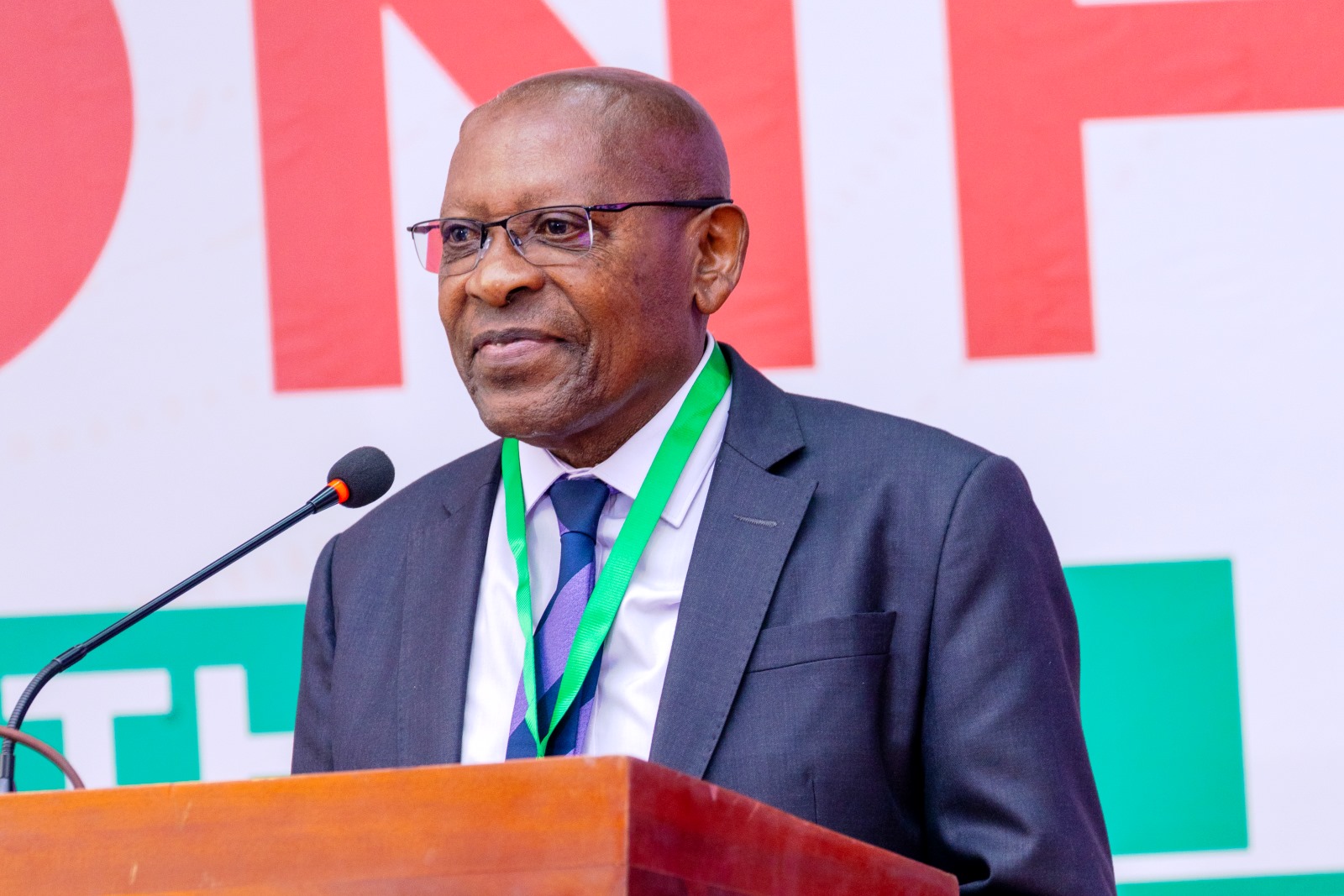
In their presentations and plenary discussion, the following issues were highlighted: 1. The 1995 Constitution was good if it had been implemented in letter and spirit 2. the presidency was given a lot of power, however consensus had been reached that checks and balances had been provided to check the power. Unfortunately, Parliament which was entrusted with an oversight role to implement the checks and balances has not delivered; 3. Whatever is included in a constitution to entrench it, the leadership in government and their values determine whether it works or not; 4. The general population including members of Parliament have not read the constitution, all this arising from poor civic education; 5. The Electoral Commission and Human Rights Commission were tasked to handle Civic Education of the population, this hasn’t been done; 6. Political goodwill from the lowest levels of government is lacking. Goodwill of government determines whether a constitution remains intact without unnecessary amendments. 7. Academia and research institutions should provide critique when things aren’t right.

The World Philosophy Day conference continued over the next days with panel discussions, academic papers, and exhibitions aimed at deepening understanding of Uganda’s constitutional framework and inspiring dialogue on ethical leadership, governance, and societal transformation.
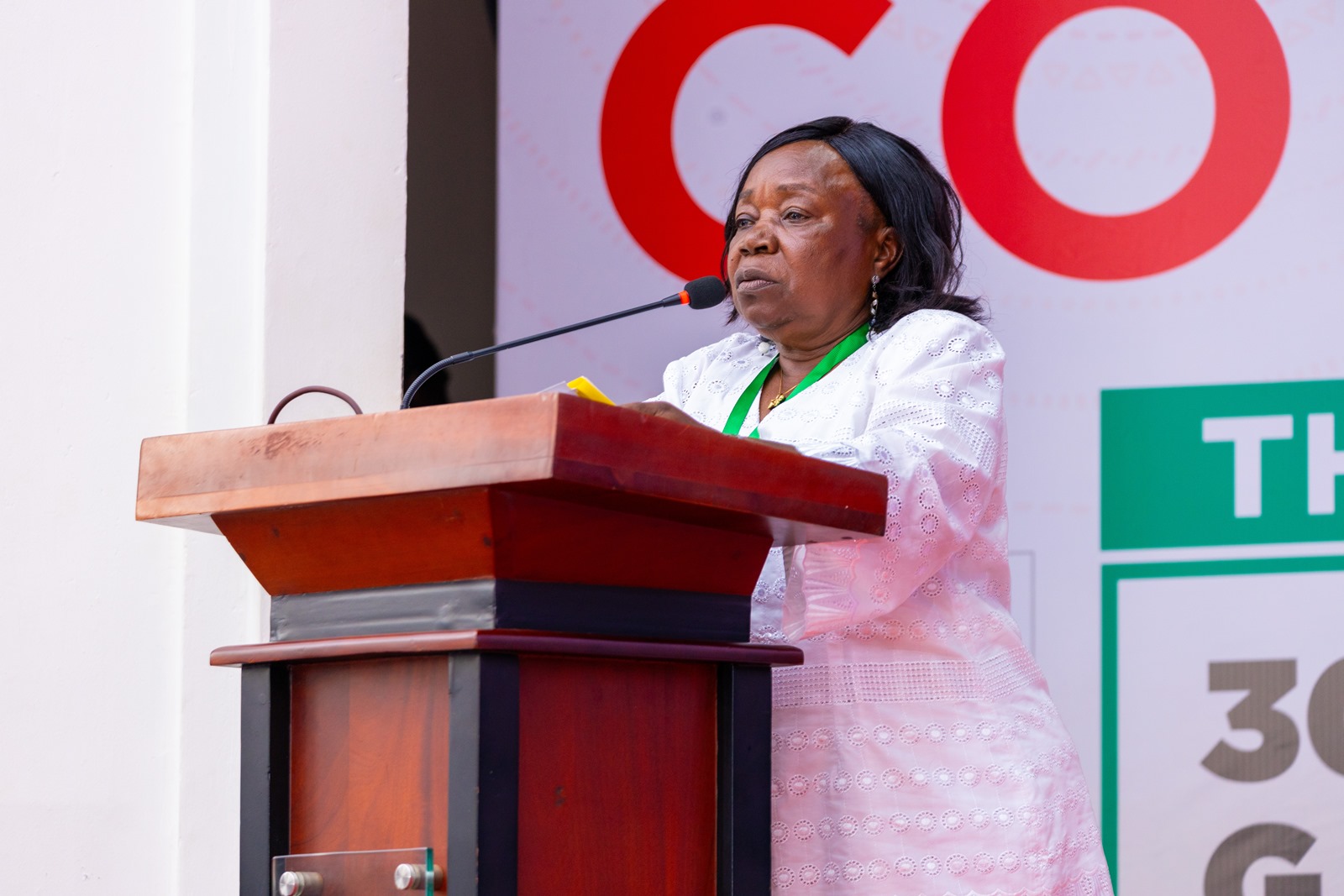
Jane Anyango and Zaam Ssali are Communication Officers for CHUSS & School of Law respectively.
Trending
-

 Law2 weeks ago
Law2 weeks agoDisclaimer Notice: LLB Pre-Entry Examination
-

 General2 weeks ago
General2 weeks agoAdvert: Admissions for Diploma/Degree Holders under Private Sponsorship 2026/27
-

 Health2 weeks ago
Health2 weeks agoHow People Earn a Living is Contributing to Malaria Risk in Uganda, Study Finds
-

 Health1 week ago
Health1 week agoKampala at a Crossroads: What New Research Reveals About Mobility, Governance, and the City’s Public Health Risks
-

 Research1 week ago
Research1 week agoInternational Fellows Recruitment – Wellcome Sanger Institute

